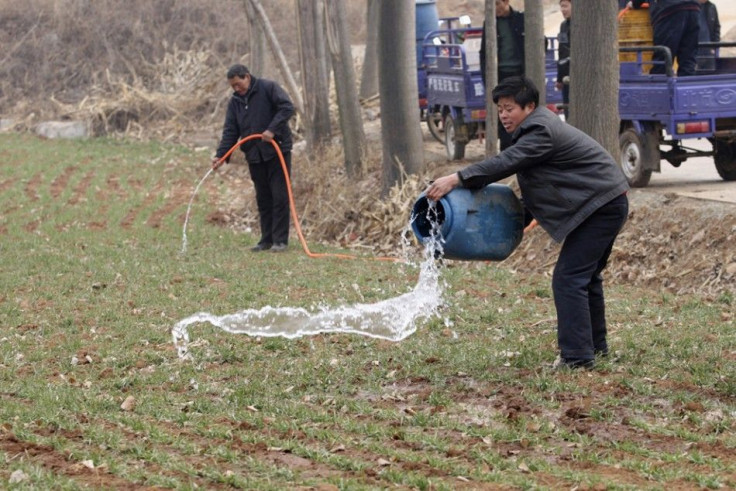China Has Big Aspirations For American Pesticide Market
A number of Chinese companies are hoping to move into the American pesticide market in a big way, according to two experts who track the lucrative industry in both countries.
As the government of the world's second-largest economy looks to enter new industries in hopes of boosting China's rapidly decelerating economic growth, some of these so-called "ag-chem" firms are already making headway in Western markets.

For some time now, the world's “Big Six” ag-chem companies – The Dow Chemical Company (NYSE:DOW), Syngenta AG (VTX:SYNN), Monsanto Company (NYSE:MON), Bayer AG (FRA:BAYN), BASF SE (ETR:BAS) and E.I. Du Pont De Nemours and Company (NYSE:DD) -- have been producing pesticides at plants in China.
That shift has led to more than half of the agricultural chemicals used in the United States being made in China, according to Telisport Putsavage, a pesticide industry expert and environmental counsel at the Sullivan & Worcester law firm in Washington, D.C.
In 2010, China's chemical production output surpassed that of the United States for the first time, and pesticide companies played a key role in driving that growth.
And the next step in China's bid to increase market share of the industry will see Chinese companies attempting to sell their own brands of products in the United States.
“What's happening, and the evolution we see coming in the future, is that gradually the bigger Chinese producers are going to try to move up the value chain and create their own brand presence here in the U.S.,” Putsavage said. “The larger companies, which are well into the hundreds of millions in revenue, are beginning to explore, and in some cases actually making moves into the U.S.”
One key sign of this expansion came in 2011, when ChemChina -- China's largest generic ag-chem company with $31.97 billion in annual sales -- acquired the world's largest generic ag-chem producer, Israeli giant Makhteshim Agan Industries, for $2.4 billion.
The acquisition, which Prime Minister Benjamin Netanyahu described at the time as "a big achievement for the economy of Israel," was an even bigger boon for China, and it illustrates the scope of the international aspirations of the nation's pesticide producers.
The Makhteshim Agan deal was a major coup not only because it expanded ChemChina's production capabilities but also because it helps position the Fortune 500 company to enter the American pesticide market.
“Maktheshim Agan has built themselves as the largest supplier of generic ag-chem because of their aggressive marketing and also because of their inroads into the American market, which is very hard to get into. Think of it as getting into a supermarket and getting shelf space,” Leonard Miller, a fellow counsel of Putsavage at Sullivan & Worcester, explained. “With all this stuff that they're making in China, they're poised to really come into the U.S. with brand recognition. The interesting thing ChemChina did was they bought the name recognition by buying the company.”
And the Chinese government has taken note of the progress, Putsavage says, as it has launched a five-year plan to reduce the number of pesticide plants -- of which there are many, owned by a wide range of companies of varying size and market penetration -- and create a field of about 20 Chinese ag-chem firms with strong international presence.
Meanwhile, Chinese companies are opening pesticide-producing plants across the United States as the first stage in what Miller describes as “a tide that's coming” that will revolutionize the American pesticide industry.
Currently there are 450 ag-chem production establishments pursuing registrations to come into the United States, only about 15 of which have actually obtained them, Putsavage said. But many of the rest likely won't be far behind.
One goal for the Chinese companies, Putsavage explained, is to sell directly to farmers rather than “be at the mercy of” the 12 distributors in the U.S. ag-chem market today.
“There is money to be made, and what the Chinese are starting to do is to recognize that and to try to get the extra value that comes from selling into the US market and to the final consumer,” Miller said.
Such a shift may eat away at the revenue of the American producers, but it will also result in greater competition, which could bring the benefit of lower prices for farmers.
Another positive side effect of Chinese pesticide firms focusing on the American market over the coming years is that the Chinese government is being forced to pay more attention to environmental concerns, Putsavage pointed out.
“Any chemical manufacturing plant that’s making a product for sale and distribution in the U.S. has to be registered with the [U.S. Environmental Protection Agency] as a producing establishment,” he said.
Just what all this will mean for American farmers and the global pesticide industry has yet to be seen, but China is clearly ascendent in the big-money world of ag-chem.
© Copyright IBTimes 2024. All rights reserved.




















